3-Day Certified Integrative Mental Health Provider (CIMHP) Training Course – Colleen A Burns
$599.00 $149.00
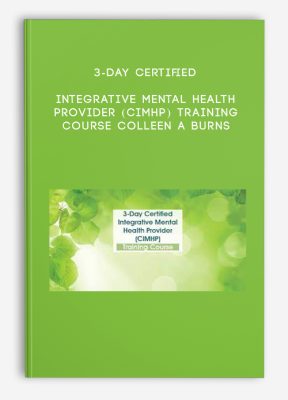
3-Day Certified Integrative Mental Health Provider (CIMHP) Training Course – Colleen A Burns
Sale Page
Archive Page
Get 3-Day Certified Integrative Mental Health Provider (CIMHP) Training Course – Colleen A Burns on Salaedu.com
Description:
Integrative Mental Health Counseling is a progressive form of therapy that combines different therapeutic tools and approaches to fit the needs of the individual client. Using integrative therapies, we modify standard treatments to fill in developmental gaps that affect each client in different ways.
Become a Certified Integrative Mental Health Professional and learn how to empower your clients to take control of their health to reach all their goals—from weight loss to stress management, resolving chronic conditions through mind body medicine, to nutrition, exercise, sleep, gut health and more.
By combining elements drawn from different schools of thought and research, integrative therapy becomes a more flexible and inclusive approach to treatment. Drawing on a holistic approach to mental and physical health we look at the whole person. Counselors can motivate, empower and inspire wellness by combining a unique approach to look at how healing the body heals the mind and how healing the mind heals the body.
Our clients present with a lifetime of symptoms. Using an integrative methodology, we can teach them to become self-sufficient by learning to observe the body’s responses to various lifestyle and dietary modifications. Thus, choosing health promoting behaviors. Our body’s work as a system and we can rebalance this system by developing strategies to incorporate into client care. Providing the newest science of nutrition, stress management and building resiliency.
As a Certified Integrative Mental Health Provider, you will enhance their clinical skills to help facilitate behavior and lifestyle change that will have a lasting, positive impact on their well-being.
As a clinician, you can go beyond therapy by supporting your clients in good health, awareness, and empowerment to heal their bodies and minds.
Outline:
Day 1 Course Outline
Morning Session:
STRESS MANAGEMENT AND BUILDING RESILIENCEY
- “Lifestyle” practices to support resiliency
- The stress experience and the mindbody connection
- Strategies for eliciting the relaxation response
- Neuroplasticity: Using the habituated brain
THE SYMPATHETIC AND PARASYMPATHETIC NERVOUS SYSTEMS
- Evidenced-based practices in integrative medicine to support behavior change
- Ways to elicit the “relaxation response” to antidote stress
- When and where to use mind-body approaches – inside and outside treatment
- Six ways to fight stress fast
POSITIVE PSYCHOLOGY AND GRATITUDE
- The science behind gratitude and abundance
- Self-compassion and renewal is the key to change
- Outline how positive psychology can increase resilience to psychological stress and physical disorders
- Gratitude & breaking free of the vicious cycle of negative thoughts
Afternoon Session:
THE SCIENCE OF HABIT LOOPS
- How the brain forms new habits
- The connection between stress, impulse control and neurotransmitters
- Why will-power isn’t enough!
- Brain-based tools for retraining the habit brain
MINDFULNESS-BASED COGNITIVE BEHAVIORAL THERAPY
- Cognitive reappraisal and positive expectation to stop allostatic loading
- Master the O.N.E. technique
- Learn how to integrate tools into clinical practice via evidenced-based techniques
- Techniques from mindful cognitive behavior therapy
MINDFULNESS AND MEDITATION
- Health-related benefits of contemporary meditative practices
- The science behind mindfulness and meditation, why meditation works and how it changes your brain
- Teach clients to begin a daily practice to ease symptoms of depression & anxiety
Day 2 Course Outline
Morning session:
INFLAMMATION
- Inflammation and the mind-body connection
- Acute and chronic inflammation
- Stress, sleep, mood, nutrition
- Identify lifestyle factors contributing to inflammation
- The links of inflammation, to stress, disease, anxiety and depression
- The enteric nervous system
GUT HEALTH, THE BRAIN AND THE MICROBIOME
- Sympathetic and parasympathetic nervous system
- Rest and digest vs. fight or flight
- A user’s guide to the gut brain axis
- This axis that connects the brain, central nervous system and the digestive tract is the basis for understanding our microbiome
NUTRITION AND MENTAL HEALTH
- Nutrition and links to mental and physical health
- Clinicians in the kitchen: Nutritional involvement in mood disorders
- Using motivational interviewing
- Evidenced-based education on how nutrition impacts mental health
- The role of sugar and fats on mood related disorders
- Chemicals and additives in food and their effect on mental and physical health
- The link between nutrition and mental health
- Recognize nutritional deficiencies signs and symptoms
- Identify why food is medicine
- Food allergens, lactose intolerance and mood
- Minerals & vitamins, magnesium, omega’s, B vitamins
- Supplements
- Clinical therapies
- Key nutrients for pain, mood, attention and cognition
- Prebiotics and probiotics
Afternoon Session:
PHYSICAL HEALTH AND IMPACTS ON MENTAL HEALTH
- Using exercise to reduce anxiety and depression
- Walking meditation
- Stretching
- Yoga
- Pilates
RESTORATIVE SLEEP & SLEEP HYGIENE
- Science of sleep, from weight to mood
- Sleeping pills and supplements
- Questionnaire for clients rating their sleep habits
Day 3 Course Outline
Morning Session:
THE ANCIENT WISDOM OF OTHER CULTURES
- Ayurvedic and Chinese medicine
- Chinese medicine, acupressure and acupuncture
- Ancient ways of eating and cooking
- Movement from Tai Chi to meditation
- Introduction to the concept of the Blue Zones & culture
LIVING IN A TOXIC ENVIRONMENT, PHYSICALLY AND EMOTIONALLY
- A toxic environment – it’s more than chemicals
- Protect the brain and body from toxins in food, air, water, and environment
- Check list for clients
- How toxins can harm parts of the brain and body
- Key food groups that are involved in detoxification
- Teach clients how to create a safe, nontoxic environment
HORMONES
- Hormones every clinician should understand
- Signs your hormones are out-of-whack
- Develop a treatment plan to address hormonal shifts, including referrals
- Tools to help clients recognize when and if hormones are not functioning properly
- Steps to take when addressing with a medical provider
Afternoon Session:
ON THE ROAD TO RECOVERY: SUBSTANCE MISUSE AND RELAPSE
- Support recovery with diet and lifestyle behaviors
- Relapse prevention techniques and tools
IMPACT OF DIET AND NUTRITION ON RECOVERY:
- How we feed ourselves is part of recovery
- Vitamin and mineral deficiencies
- Sugar and caffeine
- Self-medication hypotheses
- Nutrition impacts cravings
- Relapse prevention
- Normalize neurotransmitters and mood
- Insulin, glucose, B6 & B12
MINDFULNESS AND MEDITATION AID IN RECOVER AND RELAPSE PREVENTION
- How mindfulness and meditation promote self-care
- Incorporating a meditative practice in recovery
- Adopting a healthy lifestyle
CBD WELLNESS AND EDUCATION
- The Natural Endocannabinoid System
- Your brain is a cannabinoid playground
- CBD terminology
- Regulation
- CBD with zero THC
- Teas, tinctures and terpenes
- Cautionary statements
SCOPE OF PRACTICE
- Clinician’s scope of practice, nature of the research and limitations
- Focus on safe areas to intervene and make suggestions
- Conditions for referral
- When to recommend, suggest & limits of liability
- What clinicians can do with CIMHP
NLP online course
So what is NLP?
Firstly, NLP stands for Neuro-Linguistic Programming. Secondly neuro refers to your neurology;
Thirdly linguistic refers to language however, programming refers to how that neural language functions.
As a result,In other words, learning NLP is like learning the language of your own mind!
Moreover, NLP is the study of excellent communication–both with yourself, and with others.
It was developed by modeling excellent communicators and therapists who got results with their clients.
NLP is a set of tools and techniques, but it is so much more than that.
In conclusion, It is an attitude and a methodology of knowing how to achieve your goals and get results.
1 review for 3-Day Certified Integrative Mental Health Provider (CIMHP) Training Course – Colleen A Burns
Add a review Cancel reply
Related products
HYPNOSIS - NLP Courses
HYPNOSIS - NLP Courses
Doña Eugenia Pineda Casimiro – The Healing Potential of Sacred Mushrooms
HYPNOSIS - NLP Courses
HYPNOSIS - NLP Courses
HYPNOSIS - NLP Courses
Tom O’Connor NLP – Task Decomposition The “Magic Power of Goal Getters”
HYPNOSIS - NLP Courses

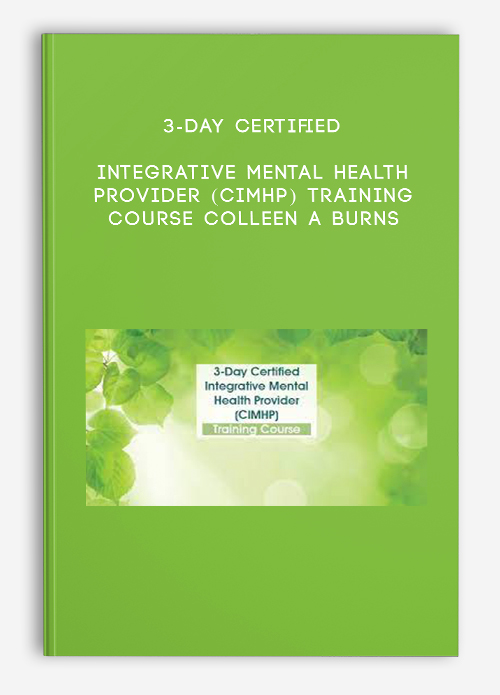



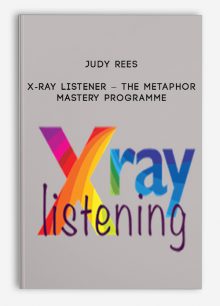

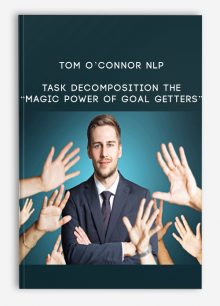

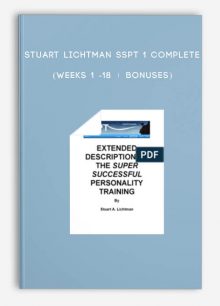
king –
“We encourage customers to contact Customer Service and think twice before making payment. All course contents will be similar to what is from the author.”
Thank you!